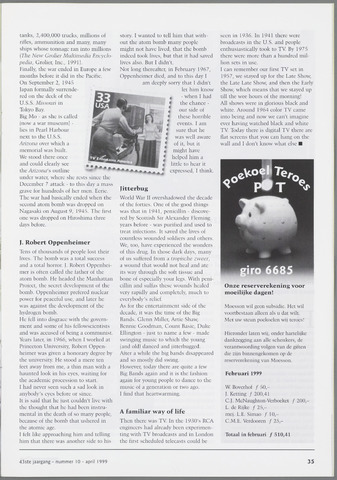iro 668
tanks, 2,400,000 trucks, millions of
rifles, ammunition and many, many
ships whose tonnage ran into millions
(The New Grolier Multimedia Encyclo
pedia, Grolier, Inc., 1991).
Finally, the war ended in Europe a few
months before it did in the Pacific.
On September 2, 1945
Japan formally surrende
red on the deck of the
U.S.S. Missouri in
Tokyo Bay.
Big Mo - as she is called
(now a war museum) -
lies in Pearl Harbour
next to the U.S.S.
Arizona over which a
memorial was built.
We stood there once
and could clearly see
the Arizona's outline
under water, where she rests since the
December 7 attack - to this day a mass
grave for hundreds of her men. Eerie.
The war had basically ended when the
second atom bomb was dropped on
Nagasaki on August 9, 1945. The first
one was dropped on Hiroshima three
days before.
J. Robert Oppenheimer
Tens of thousands of people lost their
lives. The bomb was a total success
and a total horror. J. Robert Oppenhei
mer is often called the father of the
atom bomb. He headed the Manhattan
Project, the secret development of the
bomb. Oppenheimer prefered nuclear
power for peaceful use, and later he
was against the development of the
hydrogen bomb.
He fell into disgrace with the govern
ment and some of his fellowscientists
and was accused of being a communist.
Years later, in 1966, when I worked at
Princeton University, Robert Oppen
heimer was given a honorary degree by
the university. He stood a mere ten
feet away from me, a thin man with a
haunted look in his eyes, waiting for
the academic procession to start.
I had never seen such a sad look in
anybody's eyes before or since.
It is said that he just couldn't live with
the thought that he had been instru
mental in the death of so many people,
because of the bomb that ushered in
the atomic age.
I felt like approaching him and telling
him that there was another side to his
story. I wanted to tell him that with
out the atom bomb many people
might not have lived, that the bomb
indeed took lives, but that it had saved
lives also. But I didn't.
Not long thereafter, in February 1967,
Oppenheimer died, and to this day I
am deeply sorry that I didn't
let him know
- when I had
the chance -
our side of
these horrible
events. I am
sure that he
was well aware
of it, but it
might have
helped him a
little to hear it
expressed, I think.
Jitterbug
World War II overshadowed the decade
of the forties. One of the good things
was that in 1941penicillin - discove
red by Scottish Sir Alexander Fleming
years before - was purified and used to
treat infections. It saved the lives of
countless wounded soldiers and others.
We, too, have experienced the wonders
of this drug. In those dark days, many
of us suffered from a tropische zweer,
a wound that would not heal and ate
its way through the soft tissue and
bone of especially your legs. With peni
cillin and sulfas these wounds healed
very rapidly and completely, much to
everybody's relief.
As for the entertainment side of the
decade, it was the time of the Big
Bands. Glenn Miller, Artie Shaw,
Bennie Goodman, Count Basie, Duke
Ellington - just to name a few - made
swinging music to which the young
(and old) danced and jitterbugged.
After a while the big bands disappeared
and so mostly did swing.
However, today there are quite a few
Big Bands again and it is the fashion
again for young people to dance to the
music of a generation or two ago.
I find that heartwarming.
A familiar way of life
Then there was TV. In the 1930's RCA
engineers had already been experimen
ting with TV broadcasts and in London
the first scheduled telecasts could be
seen in 1936. In 1941 there were
broadcasts in the U.S. and people
enthusiastically took to TV. By 1975
there were more than a hundred mil
lion sets in use.
I can remember our first TV set in
1957, we stayed up for the Late Show,
the Late Late Show, and then the Early
Show, which means that we stayed up
till the wee hours of the morning!
All shows were in glorious black and
white. Around 1964 color TV came
into being and now we can't imagine
ever having watched black and white
TV Today there is digital TV there are
flat screens that you can hang on the
wall and I don't know what else
Onze reserverekening voor
moeilijke dagen!
Moesson wil geen subsidie. Het wil
voortbestaan alleen als u dat wilt.
Met uw steun poekoelen wij teroes!
Hieronder laten wij, onder hartelijke
dankzegging aan alle schenkers, de
verantwoording volgen van de giften
die zijn binnengekomen op de
reserverekening van Moesson.
Februari 1999
W Boverhof 50,-
J. Ketting 200,41
C.J. McNaughton-Verboeket 200,-
L. de Rijke 25,-
mej. L.E. Simao 10,-
C.M.E. Verdooren 25,-
Totaal in februari 510,41
35
43ste jaargang - nummer I 0 - april I 999

